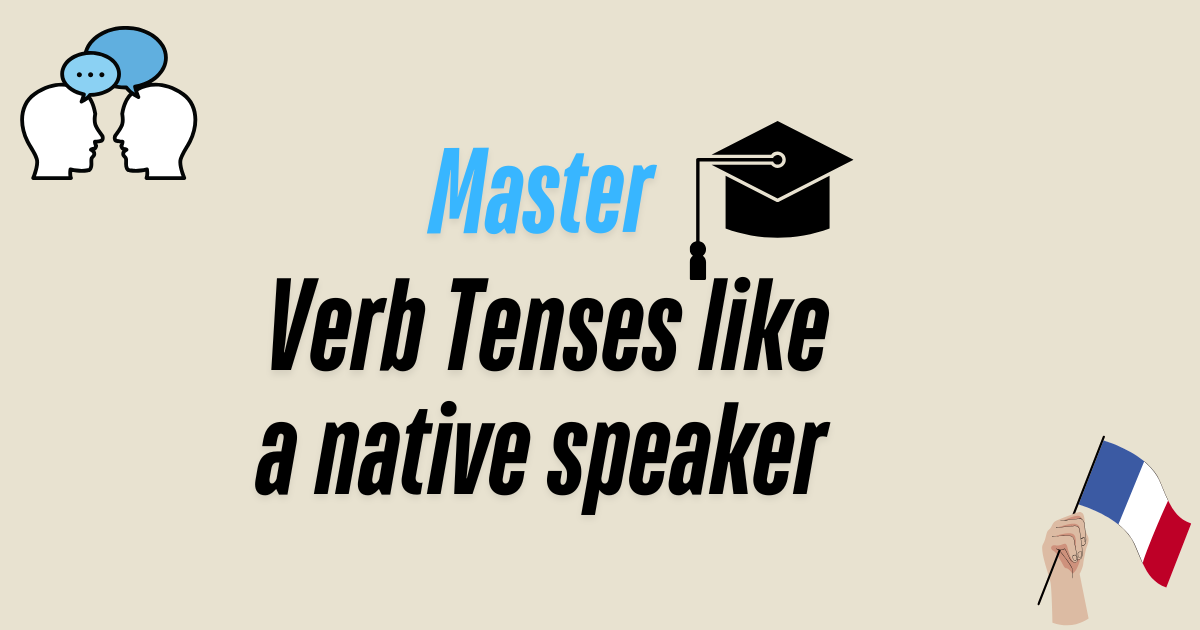Unlocking French Fluency: Master Verb Tenses Like a Native Speaker
Introduction
Becoming fluent in French goes beyond just memorizing vocabulary—it’s about mastering verb tenses that allow you to express yourself clearly and naturally. While this can seem challenging, especially with the nuances of French, knowing how to use these tenses in everyday conversations is crucial. In this post, we’ll demystify the most commonly used French verb tenses and offer practical tips on how to apply them confidently, just like a native speaker.
Section 1: Why French Verb Tenses Matter
French verb tenses are the backbone of the language, shaping how you convey time, mood, and intention. Whether you’re talking about what you’re doing now, recounting past experiences, or making plans for the future, the right tense makes your speech flow smoothly. Some tenses are integral to daily conversations, while others are more formal or literary. By mastering these tenses, you’ll not only enhance your fluency but also your understanding of French culture and communication.
Section 2: The Must-Know French Tenses for Everyday Conversations
- Présent (Present Tense)
- Usage: The present tense is the go-to tense for discussing current actions, habits, and universal truths. It’s the foundation of daily conversations.
- Examples:
- Current Action: Je mange maintenant. (I’m eating now.)
- Habits: Il joue au foot tous les dimanches. (He plays soccer every Sunday.)
- General Truths: Le soleil se lève à l’est. (The sun rises in the east.)
- Examples:
- Native Insight: In casual conversation, you can use the present tense to talk about near-future events:
- Example: On se voit demain ? (Are we seeing each other tomorrow?)
- Usage: The present tense is the go-to tense for discussing current actions, habits, and universal truths. It’s the foundation of daily conversations.
- Passé Composé (Perfect Tense)
- Usage: This tense is essential for talking about completed actions in the past, making it a staple in casual conversation. It’s used to describe what happened, what you did, or actions that are completed and relevant to the present.
- Examples:
- J’ai fini mes devoirs. (I’ve finished my homework.)
- Elle est allée au cinéma hier. (She went to the movies yesterday.)
- Examples:
- Native Insight: French speakers often prefer the passé composé over the imparfait for recounting past events, especially in spoken French.
- Usage: This tense is essential for talking about completed actions in the past, making it a staple in casual conversation. It’s used to describe what happened, what you did, or actions that are completed and relevant to the present.
- Imparfait (Imperfect Tense)
- Usage: The imparfait is perfect for describing ongoing or repeated past actions, setting the scene, or providing background details. It’s a key tense for storytelling.
- Examples:
- Quand j’étais petit, je jouais dans le parc tous les jours. (When I was little, I used to play in the park every day.)
- Il pleuvait quand je suis sorti. (It was raining when I went out.)
- Examples:
- Native Insight: Use the imparfait for memories or habitual past actions, while reserving the passé composé for specific events:
- Example: Il regardait la télé quand je suis arrivé. (He was watching TV when I arrived.)
- Usage: The imparfait is perfect for describing ongoing or repeated past actions, setting the scene, or providing background details. It’s a key tense for storytelling.
- Futur Proche (Near Future)
- Usage: The futur proche is your best friend for talking about immediate plans or actions that are about to happen. It’s much more commonly used in spoken French than the futur simple.
- Examples:
- Je vais partir dans cinq minutes. (I’m going to leave in five minutes.)
- Tu vas venir ce soir ? (Are you going to come tonight?)
- Examples:
- Native Insight: Use the futur proche to keep your conversations informal and natural. You can also use the present tense to discuss upcoming events:
- Example: Demain, je vais au bureau. (Tomorrow, I’m going to the office.)
- Usage: The futur proche is your best friend for talking about immediate plans or actions that are about to happen. It’s much more commonly used in spoken French than the futur simple.
- Futur Simple (Simple Future)
- Usage: While the futur simple is less frequent in daily conversation, it’s important for discussing more distant or certain future events.
- Examples:
- Un jour, je visiterai le Japon. (One day, I will visit Japan.)
- Il fera beau demain. (It will be sunny tomorrow.)
- Examples:
- Native Insight: The futur simple tends to sound more formal, so in everyday chats, stick with the futur proche unless you’re making long-term plans or predictions.
- Usage: While the futur simple is less frequent in daily conversation, it’s important for discussing more distant or certain future events.
- Conditionnel Présent (Present Conditional)
- Usage: The conditionnel is indispensable for polite requests, hypothetical situations, and expressing wishes. It adds a layer of courtesy and softness to your statements.
- Examples:
- Je voudrais un café, s’il vous plaît. (I would like a coffee, please.)
- Si j’avais de l’argent, je voyagerais plus. (If I had money, I would travel more.)
- Examples:
- Native Insight: To sound more polite, especially in France, use the conditionnel to make requests or suggestions:
- Example: Tu pourrais m’aider ? (Could you help me?)
- Usage: The conditionnel is indispensable for polite requests, hypothetical situations, and expressing wishes. It adds a layer of courtesy and softness to your statements.
- Subjonctif (Subjunctive Mood)
- Usage: Though it can seem daunting, the subjonctif is crucial for expressing doubt, desire, necessity, or emotion. It often follows specific phrases like il faut que (it is necessary that) or je veux que (I want that).
- Examples:
- Il faut que tu viennes à la fête. (You must come to the party.)
- Je suis content que tu sois là. (I’m happy that you’re here.)
- Examples:
- Native Insight: Start by mastering common subjunctive triggers like bien que (even though) or avant que (before) to naturally integrate this mood into your speech.
- Usage: Though it can seem daunting, the subjonctif is crucial for expressing doubt, desire, necessity, or emotion. It often follows specific phrases like il faut que (it is necessary that) or je veux que (I want that).
Section 3: Tips for Using French Tenses Like a Pro
- Embrace the Present Tense Flexibility
- In casual conversations, don’t hesitate to use the present tense for future events, especially when they’re happening soon. It’ll help you sound more fluent and relaxed.
- Master the Dance Between Passé Composé and Imparfait
- Understanding when to switch between these two past tenses is key. Use passé composé for specific events and imparfait for descriptions or ongoing actions—this balance is what gives French its rich narrative quality.
- Lean on Futur Proche for Casual Talk
- When discussing plans or actions happening soon, the futur proche is your go-to. The futur simple is more formal, so save it for situations that require it.
- Polish Your Speech with the Conditional
- French culture appreciates politeness, and using the conditionnel can soften your requests or suggestions, making you sound both courteous and natural.
- Get Comfortable with Common Subjunctive Phrases
- You don’t need to know the entire subjonctif right away, but getting familiar with its common uses will help you navigate conversations that involve emotion, doubt, or necessity.
Section 4: Practical Strategies for Perfecting French Verb Tenses
- Listen and Mimic: Pay close attention to how native speakers use different tenses in conversations, films, and podcasts. Imitating their usage will help you internalize the patterns.
- Start with the Basics: Focus on getting comfortable with the most commonly used tenses first—présent, passé composé, imparfait, and futur proche—before tackling more complex ones like the subjonctif.
- Practice Through Scenarios: Imagine everyday situations and practice using the appropriate tense. For instance, narrating a past event will help you seamlessly switch between passé composé and imparfait.
- Utilize Language Apps: Apps that focus on verb conjugations can provide instant feedback and are great tools for practicing tense usage in realistic contexts.
Conclusion
Mastering French verb tenses is your gateway to sounding like a native speaker. By understanding the nuances of when and how to use these tenses, you’ll be able to express yourself with ease and confidence in any situation. With practice and exposure, these tenses will become second nature, bringing you one step closer to fluency!




